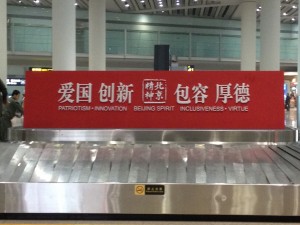Patriotism. Innovation. Inclusiveness. Virtue.
These words greet travelers stepping out of the Beijing Capital International Airport terminal, constituting the four pillars of the “Beijing Spirit” that supposedly permeates the city. Emblazoned across billboards, bridges, and street signs throughout Beijing, they serve as a constant reminder — to tourists and Beijingers alike — of the values that those within the Northern Capital should strive to embody. Yet there appears to be a striking disconnect between these noble ideals and the quotidian realities of life in Beijing, and the difference, during our time here, has most prominently centered on the idea of “inclusiveness.”
Perhaps the most noticeable instance of this discrepancy has been our experience with taxis throughout the trip: We quickly came to realize that Beijing cab drivers have an overwhelming aversion to waiguo ren — foreigners. It is often exceedingly difficult for most of us to hail taxis — only those who physically appear to be native Chinese have regular success; the rest of us watch as drivers with perfectly empty cars make eye contact and simply keep driving. We have even had taxi drivers blatantly, angrily, and quite inexplicably tell us to leave their car. The occurrence has become so commonplace that we have developed a routine, of sorts, when commuting: “foreign-looking” people conceal themselves to the side as “Chinese-looking” people hail the cab. Making such superficial groupings is uncomfortable and almost painful, but even more painful is the realization that the drivers use the same system to categorically avoid potential customers on the basis of appearance.
The apparent discrimination we have faced, however, runs even deeper. A few nights ago, I took a taxi with Jess and Haley from our hotel to the Sanlitun neighborhood. We travel the route frequently, so we knew that the cab fare would be around 20 yuan. But upon arriving in Sanlitun, we realized that the driver had been charging us on a time-based rate in lieu of the normal distance-based rate, and the fare came out to 42 yuan. While the difference in fares only amounted to a few dollars, the principle of what had happened was truly disturbing: The taxi driver had taken advantage of our foreigner status and our lack of Chinese knowledge, and there was nothing we could do to confront him about it.
To a certain degree, this kind of treatment is to be expected in almost any foreign city. Yet the regularity and intensity with which it has manifested itself demonstrates a profound antipathy for foreigners in these taxi drivers — a far cry from the “inclusiveness” supposedly embedded in the spirit of the city.
This lack of inclusivity does not confine itself to anti-foreigner sentiment; in fact, it is even more clearly identifiable in the way Beijingers relate to one another and, in particular, those perceived as not “normal” or “conventional.” For example, the director of the orphanage we visited last week spoke with us about the obstacles that orphans with disabilities face in the adoption process. Chinese parents simply do not want to adopt children with physical deformities, so his orphanage strives to give medical treatment to these orphans — many of whom would be left to die otherwise — in order to increase their chances of adoption. Even the base principle of aiding those in need seems incongruous with the priorities of the Chinese government: For years, the orphanage director had to hide the establishment from the government, concealing his activities under the guise of a “marketing research firm for orphan care products.”
Haley, Jess, Cynthia, and I were returning from dinner in a taxi last night when we saw a man fall on the sidewalk in a fit of convulsions. Not a single person walking on the street stopped to help the man, to call an ambulance, or even to give him a second glance. We couldn’t get the cab driver to pull over and stop, so we exited the cab a block farther down the road and walked back to where we saw the man collapse. Fortunately, the man was gone by the time we got there — hopefully helped by someone on the street — but the initial indifference with which other pedestrians viewed the incident was a startling reminder that Chinese society is not always so “inclusive.”
Another eye-opening perspective came from Moon, an AIESEC member we met over dinner one night. She told us that Beijing enthusiastically welcomes immigrant workers from other Chinese cities, but their school-aged children face impossibly prohibitive obstacles to entering the Beijing school system. It is here where the extent of the idea of “inclusiveness” diverges: Beijing certainly exudes inclusiveness in cases that will benefit the city’s economy, yet falls remarkably short when it comes to more personal matters.
Andrew Jacobs, a New York Times foreign correspondent with whom we ate lunch today, noted that such a phenomenon is a reflection of the two-layered nature of Chinese society: The government projects a layer of happiness and efficiency to outsiders, while the second layer — the unsavory underside of city life — remains, for the most part, under wraps. It’s plain to see that a profound lack of interpersonal trust is both a cause and effect of such interactions. Andrew also believes that trust does not come naturally to most people in China, a product of the rather bizarre interplay between traditional Chinese culture and a government that places a greater emphasis on state interests than on personal concerns.
What, then, is the “Beijing Spirit”? At this point, I’m not quite sure. But what is clear is that the government’s emphasis on the highly idealistic qualities that supposedly pervade Beijing belies the true, unfiltered condition of the city.
Aaron Berman

